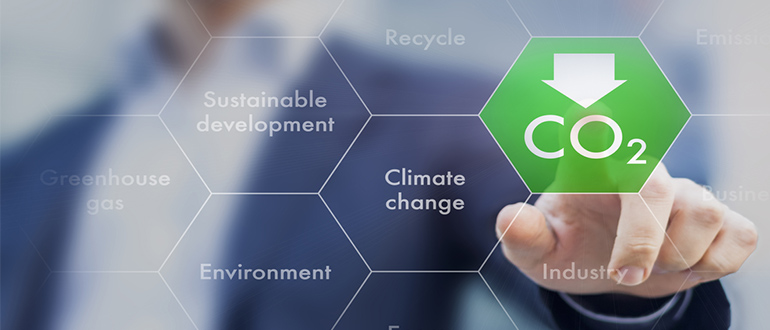Japanese business operators will be able to buy and sell unnecessary emission allocations of carbon dioxide (CO2) emissions starting in fiscal 2023 in a quest to reduce the nation's carbon footprint.
To start on a trial basis, the voluntary system will serve as a test of whether a full-fledged counterpart can be enacted someday.
Japan is considering imposing CO2 emission limits on individual enterprises in the future such as is being done in Europe.
The Ministry of Economy, Trade, and Industry on Feb. 1 unveiled the basic concept of the Green Transformation (GX) League, which will be composed of corporations aggressively seeking to decarbonize.
Under the initiative, member companies must approve of the government's goal of eliminating net-zero CO2 emissions by 2050. They are also required to submit their own carbon footprint reduction goals for fiscal 2030 as part of the program.
Businesses will be required to disclose the amounts of CO2 generated in a variety of processes, from product manufacturing to disposal. The league will issue an annual report on their emissions reduction efforts.
The economy ministry is currently considering giving financial aid to firms that are pursuing advanced projects, such as subsidies and other kinds, through the initiative.
In the period leading up to the implementation of the emission trading scheme, the carbon credit market will be established as part of the GX League.
Businesses that succeed in lowering their carbon footprints more drastically than planned will be eligible for government subsidies. Companies will buy credits to make up for missed targets if they do not achieve them.
In autumn 2022, a verification trial will begin, with the transaction system commencing operations in April 2023 at the earliest. According to the economy ministry, 500 large and other firms will participate.
As the emissions trading mechanism will almost certainly add to corporate expenses, businesses would be permitted to opt-out under the economy ministry's proposal.
According to a senior ministry official about its plan, a system to adjust emissions between companies is essential for realizing a carbon-free society and the initiation of emission transactions will become unavoidable at some point.
Should Tokyo take no action to address those changes, Japanese firms' competitiveness could be eroded. With this in mind, the ministry is working to speed up carbon decarbonization through planned actions.



 U.S.-India Trade Framework Signals Major Shift in Tariffs, Energy, and Supply Chains
U.S.-India Trade Framework Signals Major Shift in Tariffs, Energy, and Supply Chains  Silver Prices Plunge in Asian Trade as Dollar Strength Triggers Fresh Precious Metals Sell-Off
Silver Prices Plunge in Asian Trade as Dollar Strength Triggers Fresh Precious Metals Sell-Off  OpenAI Expands Enterprise AI Strategy With Major Hiring Push Ahead of New Business Offering
OpenAI Expands Enterprise AI Strategy With Major Hiring Push Ahead of New Business Offering  Trump Signs Executive Order Threatening 25% Tariffs on Countries Trading With Iran
Trump Signs Executive Order Threatening 25% Tariffs on Countries Trading With Iran  TrumpRx Website Launches to Offer Discounted Prescription Drugs for Cash-Paying Americans
TrumpRx Website Launches to Offer Discounted Prescription Drugs for Cash-Paying Americans  TSMC Eyes 3nm Chip Production in Japan with $17 Billion Kumamoto Investment
TSMC Eyes 3nm Chip Production in Japan with $17 Billion Kumamoto Investment  How America courted increasingly destructive wildfires − and what that means for protecting homes today
How America courted increasingly destructive wildfires − and what that means for protecting homes today  Dollar Steadies Ahead of ECB and BoE Decisions as Markets Turn Risk-Off
Dollar Steadies Ahead of ECB and BoE Decisions as Markets Turn Risk-Off  Fungi are among the planet’s most important organisms — yet they continue to be overlooked in conservation strategies
Fungi are among the planet’s most important organisms — yet they continue to be overlooked in conservation strategies  Extreme heat, flooding, wildfires – Colorado’s formerly incarcerated people on the hazards they faced behind bars
Extreme heat, flooding, wildfires – Colorado’s formerly incarcerated people on the hazards they faced behind bars  Russian Stocks End Mixed as MOEX Index Closes Flat Amid Commodity Strength
Russian Stocks End Mixed as MOEX Index Closes Flat Amid Commodity Strength  Gold Prices Slide Below $5,000 as Strong Dollar and Central Bank Outlook Weigh on Metals
Gold Prices Slide Below $5,000 as Strong Dollar and Central Bank Outlook Weigh on Metals  What’s so special about Ukraine’s minerals? A geologist explains
What’s so special about Ukraine’s minerals? A geologist explains  Gold and Silver Prices Slide as Dollar Strength and Easing Tensions Weigh on Metals
Gold and Silver Prices Slide as Dollar Strength and Easing Tensions Weigh on Metals  China Extends Gold Buying Streak as Reserves Surge Despite Volatile Prices
China Extends Gold Buying Streak as Reserves Surge Despite Volatile Prices  Dollar Near Two-Week High as Stock Rout, AI Concerns and Global Events Drive Market Volatility
Dollar Near Two-Week High as Stock Rout, AI Concerns and Global Events Drive Market Volatility  Fed Governor Lisa Cook Warns Inflation Risks Remain as Rates Stay Steady
Fed Governor Lisa Cook Warns Inflation Risks Remain as Rates Stay Steady 































